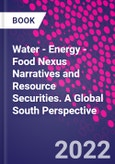Water-Energy-Food Nexus Narratives and Resource Securities: A Global South Perspective provides a knowledge synthesis on the water-energy-food
(WEF) nexus, focusing primarily on the global south. By presenting concepts, analytical tools, and case studies, the book serves as a practical resource
for researchers, policymakers, and practitioners in sustainability and functional roles across all three sectors. It addresses key issues related to data
availability, tools, indices, metrics, and application across multiple scales, beginning with a summary of existing knowledge. Finally, it examines the WEF
nexus, presents global insights, and discusses future considerations and implications. This book presents an overview of existing knowledge on the WEF
nexus and examines how such research aligns with emerging global WEF nexus perspectives, making it ideal for professionals, government entities,
private industry, and the general public.
Please Note: This is an On Demand product, delivery may take up to 11 working days after payment has been received.
Table of Contents
1. The Water-Energy-Food Nexus: its transition into a transformative approach
2. Some quantitative watereenergyefood nexus analysis approaches and their data requirements
3. EO-WEF: a water, energy, and food nexus geotool for spatial data visualization and generation
4. Scales of application of the WEF nexus approach
5. Tools and indices for WEF nexus analysis
6. Transboundary WEF nexus analysis: a case study of the Songwe River Basin
7. Applying the WEF nexus at a local level: a focus on catchment level
8. A regional approach to implementing the WEF nexus: a case study of the Southern African development community
9. Exploring the contribution of Tugwi-Mukosi Dam toward water, energy, and food security
10. The watereenergyefood nexus as an approach for achieving sustainable development goals 2 (food), 6 (water), and 7 (energy)
11. Enhancing sustainable human and environmental health through nexus planning
12. Financing WEF nexus projects: perspectives from interdisciplinary and multidimensional research challenges
13.�The WatereEnergyeFood nexus as a rallying point for sustainable development: emerging lessons from South and Southeast Asia
14. The watereenergyefood nexus: an ecosystems and anthropocentric perspective .
15.�Watereenergyefood nexus approaches to facilitate smallholder agricultural technology adoption
16. Building capacity for upscaling the WEF nexus and guiding transformational change in Africa
17. WEF nexus narratives: toward sustainable resource security








